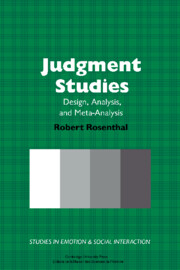Book contents
- Frontmatter
- Contents
- Preface
- PART I THE DESIGN OF JUDGMENT STUDIES
- 1 The nature of judgment studies
- 2 Sampling judges and encoders
- 3 Stimulus selection and presentation
- 4 Judges' responses
- PART II THE ANALYSIS OF JUDGMENT STUDIES
- PART III THE META-ANALYSIS OF JUDGMENT STUDIES
- Appendix Statistical tables
- References
- Name index
- Subject index
4 - Judges' responses
Published online by Cambridge University Press: 06 November 2009
- Frontmatter
- Contents
- Preface
- PART I THE DESIGN OF JUDGMENT STUDIES
- 1 The nature of judgment studies
- 2 Sampling judges and encoders
- 3 Stimulus selection and presentation
- 4 Judges' responses
- PART II THE ANALYSIS OF JUDGMENT STUDIES
- PART III THE META-ANALYSIS OF JUDGMENT STUDIES
- Appendix Statistical tables
- References
- Name index
- Subject index
Summary
We have talked often of judges' ratings, evaluations, observations, and judgments, but we have not yet been very explicit about the precise nature of the dependent variable, the judge's response. What shall be the format in which the judges make their response?
There are two great traditions of response format in the area of nonverbal communication, the categorical and the dimensional, and each has been used in a wide variety of research studies (e.g., Argyle, 1975; Buck, 1979; DePaulo & Rosenthal, 1979a; Ekman, 1973; Ekman, Friesen, & Ellsworth, 1972; Izard, 1971, 1977; Mehrabian, 1970; Rosenthal, 1966, 1979c; Scherer, 1979a, 1979b; Zuckerman et al., 1979; Zuckerman et al., 1976). The categorical response presents the judge with two or more response alternatives of which one (usually) is selected. The dimensional response format presents the judge with some form of more or less continuous rating scale (e.g., 1–5, 1–7, or 1–9) of which one numerical value is to be circled, crossed out, or otherwise selected.
There is no evidence to suggest that one of these response formats is uniformly superior, but each seems especially well suited to certain research questions and orientations. For example, if one holds a theory that there are m basic emotions, it is reasonable to employ a categorical response format including some or all of these m basic emotions (Ekman, 1973; Izard, 1971).
- Type
- Chapter
- Information
- Judgment StudiesDesign, Analysis, and Meta-Analysis, pp. 56 - 84Publisher: Cambridge University PressPrint publication year: 1987



